The - 10-month program begins on , and ends on , .
Three Policies
- Diploma Policy
- A certificate of completion will be awarded to students deemed to have met the goals specified in the Curriculum Policy; their educational achievements shall be assessed on the basis of positive participation in classroom activities, homework, and learning activities outside the classroom as well as examinations and the final presentation.
- Curriculum Policy
- Classroom activities, homework, and learning activities outside the classroom will be arranged to enable students to accomplish the goals listed below, which follow from the IUC mission and aim at acquisition of the four Japanese language skills of reading, writing, listening, and speaking as well as the “kanji for common use.” Classes will be small-group lessons conducted entirely in Japanese.
- Mastery of formal expressions and linguistic behavior that will meet the standards expected in Japanese society and be able to appropriately and accurately use and execute them according to the needs of the situation.
- In the student’s own field, ability to accurately understand the content of academic books and other materials necessary for research or professional purposes, discuss them in Japanese with experts, write extensive, cohesive passages, and conduct oral presentations.
- Outside the student’s field of specialization, the ability to accurately follow a wide variety of discourse without misconstruing the speaker’s intent and to exchange opinions about it on an equal basis with educated Japanese people.
- Admission Policy
- The IUC admits those who are committed to acquiring, through active learning both inside and outside the classroom, the advanced proficiency in Japanese required for academic or other professional purposes. Specifically, the IUC admits those who meet the following conditions:
- Are graduate students, undergraduates who plan to attend graduate school, or university graduates already employed in fields related to Japan.
- Have completed 3 years and more than 450 hours of Japanese language instruction at a university or elsewhere, or who possess an equivalent level of Japanese language proficiency. Having passed the intermediate level of the OPI or level N2 of the JLPT is also desirable.
- Possess advanced academic or professional endowments and future potential and exhibit a positive interest in various issues related to Japanese culture and society.
- Will participate enthusiastically in classroom activities (discussions and presentations) and can autonomously engage in homework and other learning activities outside the classroom.
General Structure
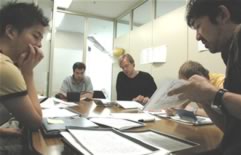
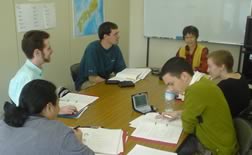
In the 10-month program, classes are conducted from 10:00 am to 3:00 pm, Monday through Friday. Wednesday afternoons are reserved for extra-curricular activities. The number of classes per week is reduced in the latter half of the program to accommodate the increase in specialized study and tutorial instruction. Students admitted to the Center should be prepared to devote themselves full time to language study. The workload does not leave time for dissertation research or for outside employment.
The program is divided into two parts. In the first half of the program, teaching is geared toward development of competence in constructing complex utterances and extended discourse, using Japanese accurately and appropriately in social settings, and expressing and understanding Japanese on general topics. This training provides a solid foundation for specialized, advanced language training. In the second half of the program, instruction centers on developing specialized language skills necessary for students to pursue their academic goals or professional work.
During the first eight weeks, morning classes focus on consolidating basic and intermediate Japanese skills essential for further advancement. Students also develop skills needed to converse successfully with people of varying social levels. During the second eight weeks, the focus is on developing skills in advanced discourse. The proper use of Japanese conjunctions is emphasized. Grammatical constructions and patterns necessary for sophisticated and extended speech are introduced. Small group instruction is integrated each day with computer-based study (individual and teacher-assisted).
First Half of Program (September - December)
Morning Session
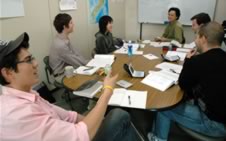
- Japanese Grammar Review
- This segment reviews and consolidates both basic and intermediate Japanese skills essential for further advancement.
- Formal Expressions for Japanese Interaction
- Aimed at providing skill in talking with people of different social and academic levels. Covers greetings, polite language, social customs, etiquette, and other areas of social interaction. This segment uses the Center's Formal Expressions for Japanese Interaction text (a new edition currently being developed). A computer-based version of this text is also available for individual productive speaking practice.
- Conjunctive Expressions in Japanese
- This is a two-week segment designed to provide skill in the proper use of Japanese conjunctions.
- Integrated Japanese Advanced Course
- Develops the skills required in advanced level discourse. The text is focused on the grammatical patterns, constructions, and expressions necessary for sophisticated and extended speech. Particular attention is paid to the differences between spoken and written usage of the patterns covered.
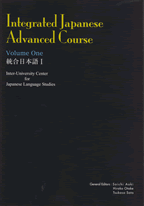
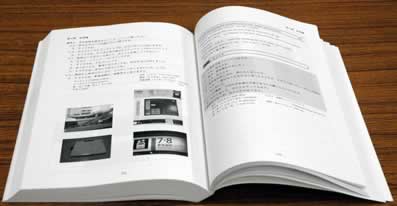
Afternoon Session
- Applied Japanese Skills I
- Interview clips and news videos are combined with short personal narratives and newspaper articles for an integrated approach to listening and reading comprehension.
- Applied Japanese Skills II
- Excerpts from books, magazines, and newspapers are employed for reading improvement and video-taped portions of documentaries, news clips, and other general-interest programs are used for aural comprehension. Classroom discussion of these materials develops advanced skills in verbal communication.
Second Half of Program (January - May)
- Integrated Japanese Advanced Course
- This text is continued into the end of the program, depending on the progress of each section of students.
- Applied Japanese Skills III
- Develops skills in expressing and understanding topics of special interest in aural-oral and written modes. Students select classes from among such areas as modern history, business, and popular culture. Both written and video materials are utilized and discussion concerning the topics is emphasized.
- Elective Courses
- These courses provide an introduction to the vocabulary and content of each student's academic or professional area of interest. Normally, sections are organized for modern Japanese literature, anthropology, history, politics/economics, law, and listening, speaking, reading and writing.
- Project Work
- Students pursue a research topic on a topic of their own choosing. Investigation involves academic research using written materials, interviews, polls, or other methods of inquiry.
- Final Oral Presentation
- At the end of the ten-month program, each student gives a 15-minute formal oral presentation in Japanese on a topic of the student's choice before an audience of fellow students, instructors, and guests.
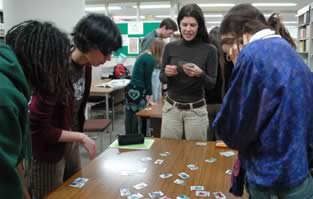
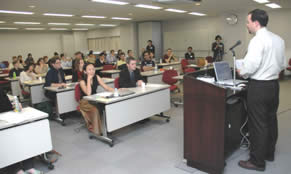
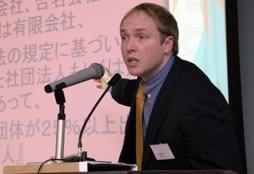
Other
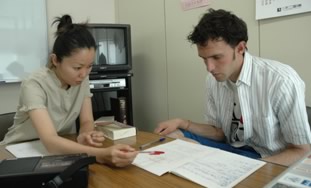
- Special Kanji Intensive Program (SKIP)
- This program, pursued by students throughout the year, is one of the most important features of the Center program. Using the Kanji in Context Center texts, published by the Japan Times, students are able to systematically study the 2,136 kanji used in modern Japanese. The materials focus not only on the study of each individual kanji, but also on the vocabulary in which the kanji are used. The Center now has available a computer-based version of Kanji in Context which enables students to do highly efficient flash-card recognition of kanji/kana and students are exposed to a wide range of vocabulary throughout the year. By combining this with intensive study of individual kanji using Kanji in Context, students have the opportunity to totally master kanji before the year is over.
- Lectures and Other Educational Opportunities
- In addition to the language training program, the Center provides students with other educational opportunities, including field trips, site visits, outings, and periodic lectures by distinguished Japanese scholars and other individuals.
- Optional Courses
- A course in Japanese calligraphy is taught weekly throughout the year by a professional calligrapher. Also, a course on Japanese business organization and practices is offered. Other optional classes, such as a classic Japanese grammar course and a Kanbun course, may be offered based on demand.
- Interaction with Yokohama City University Students
- In 1998, the Center concluded a cooperative agreement with Yokohama City University that allows Center students to utilize the university library. Center students are encouraged to set up informal study groups with Yokohama City University students.
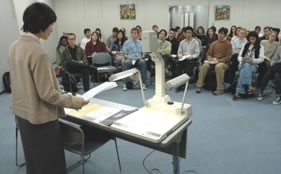
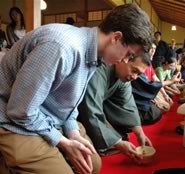
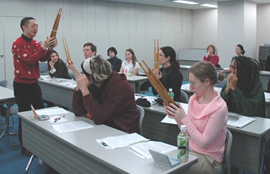
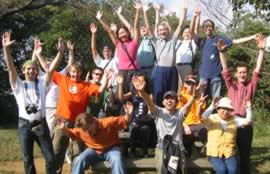



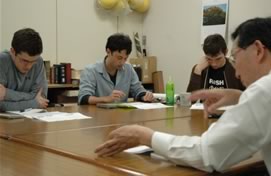
Credit
The center does not grant academic credit. However, at the end of each year the Center provides an evaluation of work completed during the Center program, a copy of which will be sent to the student's advisor upon request. Credit for work done at the Center must be arranged through the student's home institution.